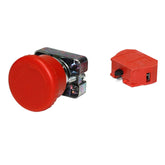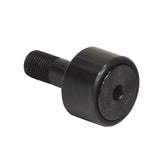Weather Seals Buyers Guide
If you want to keep the elements outside where they belong, a weather seal is the most important investment you can make for your hangar door. Weather seals play a crucial role in maintaining the integrity and functionality of hangar doors. Designed to create a barrier against the elements, they help prevent air, water, dust, and even wildlife from infiltrating the hangar space. In this guide, we'll delve into the qualities, as well as the pros and cons, of each type of seal to help you understand how hangar door weather seals work.

Rubber Seals
Rubber seals are a traditional weather sealing option that have been widely used in hangar doors for decades. They are typically made from durable synthetic rubber materials, such as EPDM (ethylene propylene diene monomer). Rubber seals are known for their flexibility, resilience, and ability to provide a tight seal against uneven surfaces.
Rubber seals are highly resistant to wear and tear, making them ideal for high-traffic areas and harsh weather conditions. They create a reliable barrier against air, water, and contaminants, ensuring optimal protection for hangar interiors. Most importantly, rubber seals can be quickly installed using adhesive or fasteners, minimizing downtime during maintenance or replacement and making them more convenient.
While rubber seals offer good sealing properties, they may lack the flexibility to accommodate irregular door surfaces or movement. Over time, rubber seals may experience compression set, causing them to lose their original shape and effectiveness. In any case, rubber seals are a necessary addition to any hangar door in order to make it fully weatherproof.
Brush Seals
Brush seals, also known as bristle seals or strip brushes, are innovative weather sealants that consist of thousands of densely packed nylon or polypropylene bristles, which create a flexible barrier that conforms to the contours of the door. This type of seal is necessary for providing an effective seal against drafts, insects, and debris.
Brush seals are highly adaptable and can conform to irregular surfaces, gaps, and movements, ensuring a tight seal in all conditions. The smooth, flexible bristles of brush seals reduce friction and noise during door operation, resulting in smoother and quieter performance. Additionally, they are designed to withstand repeated use and exposure to the elements, offering long-lasting protection for hangar doors.
However, brush seals may have a higher upfront cost compared to rubber seals, but their durability and performance justify the investment over time, and periodic cleaning may be necessary to fully remove debris and ensure optimal performance.

When choosing weather seals for your hangar door, consider factors such as durability, flexibility, and ease of installation. While rubber seals offer reliable sealing properties and easy installation, brush seals provide superior adaptability and longevity. Ultimately, a combination may lead to the best full sealing effects for your hangar door, increasing its longevity to the greatest degree.
At Hangar Door Parts, we offer a wide selection of high-quality rubber seals and brush seals to meet your weather sealing needs. Have any questions about the weather seals we offer, or want to get started adding these seals to your door? Contact us today to explore our range of products and find the perfect solution for your unmet hangar door needs!





